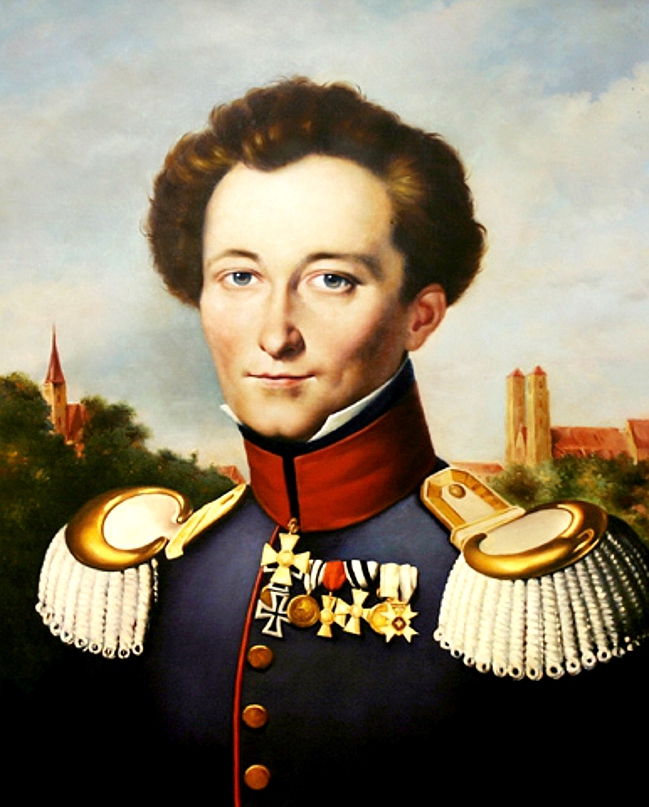Carl Von Clausewitz Facts For Kids
Carl von Clausewitz was a Prussian general and military theorist known for his influential ideas on the moral and political aspects of war, particularly in his famous work 'On War.'


Set reading age
View for Kids
Easy to read and understand
View for Students
Clear, detailed explanations
View for Scholars
Deep dives and big ideas
Introduction
Carl von Clausewitz was a famous Prussian general and thinker born on June 1, 1780, in Burg, Germany. 🌍He is best known for his ideas about war and how it connects to politics. His most famous book, "On War," talks about why countries fight each other. Clausewitz believed that understanding the reasons behind war could help leaders make better decisions. He shared his ideas more than 150 years ago, but they are still important today. His thoughts are studied by military leaders and students worldwide! 📚
Gallery of Carl Von Clausewitz Facts For Kids
Military Career
Clausewitz had a successful military career and fought in many battles. ⚔️ He joined the Prussian army in 1792 and was there during the Napoleonic Wars. These wars were fought between 1803 and 1815 in Europe, and Clausewitz used his experiences to write about war. He was promoted to general in 1818! After the wars, he became a military teacher and shared his knowledge with young officers. His blend of battle experience and teaching helped him create his famous theories about war and conflict.
Theories Of War
Carl von Clausewitz believed that war is complicated and influenced by many factors. 🔍He said that war is a form of politics and that leaders need to think about people's feelings and motivations. He introduced the idea of the "fog of war," which means that in battles, not everything is clear. Events can be uncertain and confusing! 😮Clausewitz also talked about "friction," which refers to unexpected problems that can occur during a war. His theories encourage leaders to think critically and adapt to new situations!
On War: Key Concepts
One of Clausewitz's key concepts is the "trinity." 🌟 This refers to three important elements in war: the people, the army, and the government. Clausewitz believed that these three parts must work together. The people's support is crucial for a successful war, while the army executes strategies, and the government's decisions guide the process. He also introduced the idea of "center of gravity," which means focusing efforts on the enemy's most important strength. Understanding these concepts helps leaders plan better in conflict situations! 🎯
Early Life And Education
Clausewitz grew up in a modest family, and his father was an officer in the Prussian army. At 12 years old, he joined a military school called the Prussian Cadet School in Berlin. 🎓Clausewitz loved studying history and military tactics, which helped him become a soldier. After finishing school, he became a soldier in the army. His early experiences taught him how wars worked and why they happen, shaping his future ideas about military strategy. He walked through the community learning from others, which influenced his thoughts. 🏰
Clausewitz In Popular Culture
Carl von Clausewitz's ideas also appear in popular culture! 📺You can find references to him in movies, books, and games. Characters in war movies sometimes follow his strategies to achieve victory. Also, some video games based on military tactics use his theories for gameplay! 🎮His name has become widely known in discussions about war and strategy, making him a figure that inspires both historical learning and entertaining storytelling, helping everyone understand the complexities of conflict! 🌟
Political Implications Of War
Clausewitz taught that wars aren’t just about fighting; they also involve politics! 🇩🇪 He believed that wars happen for reasons like national interests or territory. When fighting a war, leaders must think carefully about how their actions will affect their country and its people. Victory doesn't just mean winning battles; it needs to align with political goals to ensure peace. Clausewitz showed that understanding these connections helps leaders make smarter decisions. War and politics are like two sides of the same coin! 💰
Influence On Military Strategy
Clausewitz's ideas on military strategy changed how wars are planned and fought. 📜Military leaders study his theories to understand the unpredictability of war better. He encouraged flexibility, telling soldiers to adapt to new challenges instead of sticking to rigid plans. His teachings stress the importance of understanding the enemy's moves, using intelligence, and taking the initiative. Because of Clausewitz, modern armies focus on strategies that can change during battle, making them more effective in achieving their goals. 🏆
Critiques Of Clausewitz's Theories
While Clausewitz's ideas are influential, some people have criticized them, too. 😕Some military leaders believe that his theories are too focused on grand strategies and don't fit every situation. Others argue that his writings can be confusing and hard to understand. Additionally, modern warfare has changed with technology in ways Clausewitz didn’t predict. 🚀Some think new strategies are needed for today’s wars, especially with drones and cyberattacks. Debates about Clausewitz’s ideas continue, which shows how important his work remains! 🗣️
Legacy And Impact On Modern Warfare
Carl von Clausewitz's impact on military thinking is significant! 🎖️ His ideas are taught in military schools around the world. Famous leaders, like the American General Dwight D. Eisenhower, used Clausewitz’s theories during battles. His writings help today’s military strategists create plans and respond to challenges. Clausewitz’s lessons on leadership and decision-making continue to influence not just military operations but also aspects of business and politics, making his work timeless! 🔄Leaders in various fields study his work to improve their own strategies even today.
Carl Von Clausewitz Facts For Kids Quiz


Make things. Learn new skills. Share safely.
DIY is a creative community where kids draw, build, explore ideas, and share.
No credit card required